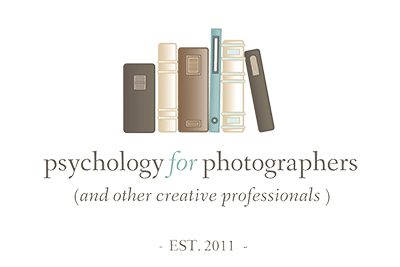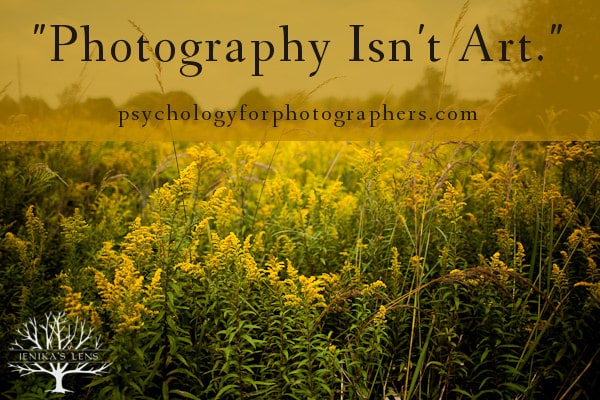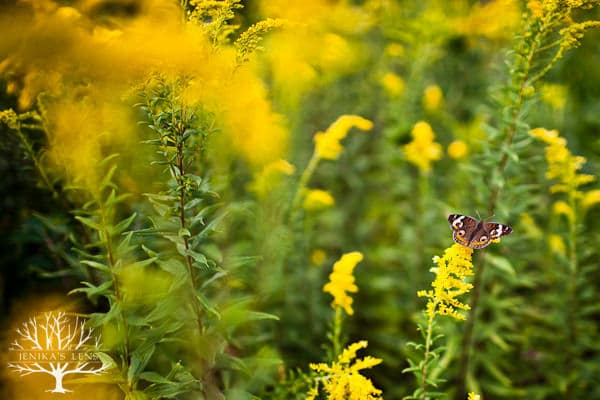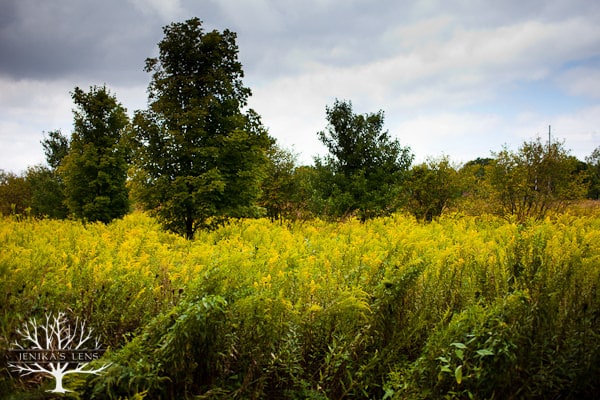The Blog Library
“Photography Isn’t Art.”
Check your gut reaction to the title.
Because it’s less of a title, and more of a psychological test. I’ll explain this in a minute.
First, settle down and let me tell you a story about bees.
As childhood memories of swelling red welts may remind you, many kinds of bees (and wasps) should not be messed with because they sting. Many bees and wasps also have a characteristic yellow-and-black striped coloring. Insect predators categorically learn that when they see yellow and black stripes, it’s time to stay away. They know that instead of a tasty snack, they’re going to get a mouthful of venom. Predators are happy with this yellow-and-black system because they know who to avoid munching on, bees and wasps are happy because they don’t get eaten.
But at some point, other insects “figured this out.” By developing yellow and black stripes, these insects looked like they belonged in the category of stinging bees and wasps, even though they couldn’t sting. Yet potential predators would assume they were poisonous and leave them alone. Score!
This sort of imitation by non-stinging insects is known as “mimicry” (Batesian mimicry, if you want to get specific). In this case, the “mimic” gets an advantage of not being eaten without having to go through the expense and energy of actually producing poison and stingers.
Bees can’t write op-eds, but if they could, you can tell they’d be pretty mad about this. Over time if predators figure out that stripes don’t always categorically equal poison, it dilutes the advantage of having stripes, and they’ll start eating more bees. Then bees will have gone to all that work of creating poison for nothing.
The moral of this tale?
Categories are important.
Categories are information shortcuts. Not just for bees and the predators thereof, but to us as humans. It’s easier to remember “don’t eat stuff with yellow and black stripes” or “X brand makes great jeans” than to actually evaluate every option under the sun and decide for yourself. But for that to work, categories need to be accurate.
Back in the not-so-distant past, if you mis-categorized an unfamiliar berry, spider, or cloud in the distance, you could wind up dead. Even today, we’re quite invested in categorizing things correctly – not just so we can avoid getting stung or missing out on good food, but so we know how to spend our money and precious resources.
And because money is often on the line, people are going to be invested in maintaining the integrity of categories in commerce – because they represent rules for how people shell out their money.
“Art” is also an important category.
Although there are some negative connotations to the word “artist,” the word “art” carries along with it ideas of respect, refinement, technical mastery, tradition, and self-expression. Artists carry and communicate cultures, and have a place in history alongside nation-builders and powerful leaders.
Even though you can’t necessarily eat, use, drive, or keep yourself warm with art, we still tend to acknowledge its value to the human family.
It’s understandable to me why some artists wouldn’t want photographers to be called “artists.”
On the surface, you wouldn’t think it would matter so much. Far stranger things are called “art” than a beautiful photographic masterwork.
And yet, if too many mimics are called “art,” then it dilutes the category.
That is, if people encounter “art” that they don’t think carries the true characteristics of art, then (just like the harmless flies with black and yellow stripes) those assumptions spill into their perception of the rest of “art.” People might start to accord ‘artists’ less respect. And “real art” could be worth less if there’s more of it.
The problem, of course, is that “art” is a valuable category, but there are no clear yellow-and-black stripes that stand out to say “this is art.”
It’s hard to decide the rules. Does art have to be beautiful? Must it be ‘original’? Is art just human creative expression? If a machine is involved, does that mean it’s not human creative expression? Does it even need to be human – can elephants make art?
There’s a fantastic debate on this website about whether or not photography is art.* While some arguments can be easily dealt with (“photography is just pressing buttons”), others merit nuanced discussion. Like whether or not photography can be considered original, or whether it’s inherently a copy of whatever is in the real world. Or whether or not originality is even a requisite part of art.
When it’s hard to decide the rules, then your own personal definition probably reveals a lot about you.
If you believe “art” means toiling over a painting for weeks on end, then you’ll probably balk at the idea that a “work of art” could be recorded in 1/120th of a second. And you might worry that a mimic photographer (who can perhaps churn out more “masterpieces” in one week than you can) might drag down the value of art.
If you’re a photographer and you believe that what you do is art, and especially if you feel that value is added to your brand by calling yourself an “artist,” you’re probably going to be extra mad about someone saying what you do isn’t art. 😉
If you believe that art is just fundamentally about aesthetics, including masterful choices about light and space, then you probably care less about the medium.
None of those opinions definitively describe art itself, but they do tell you a little something about the opinion-holder.
For this reason, if you can’t resolve a debate, it’s fun to watch it anyway.
Quick example: Take the word “messy.” If I took 10 of you and asked you to tell me whether or not my office closet is “messy,” I’d probably get 10 slightly different answers.
If you pride yourself on your inner Martha Stewart, and my closet has fewer labeled boxes than yours, you might say it’s messy.
But if your closets at home require you to back up against the door to get it closed, then mine might seem super-organized.
The answer might reveal more about you than it does about my closet.
So just for fun, consider your reaction to the title of this post:
Did the title make you mad? Or nod your head vigorously? Or raise your eyebrows and click to read more? That’s probably going to depend on a lot of things. Things like: What associations you have with the term “art.” How much you stake your identity on the word “photographer” or “artist.” How you earn your living. How valuable or legitimate you consider “art” to be.
Most importantly, your reaction depends on how you personally define the word “art.” What is it? And is art an actual thing in the physical world, or is it just a label we apply to a bunch of other things, like the word “blue” or “inspiring”?
Overall, or at least until philosophers and artists and photographers get together and sort out how to categorize our relatively young medium, your reaction to the phrase “Photography Isn’t Art” probably says as much about you, how you define and formed that category, as it does about photography or art itself.
Fun food for thought.
* My own take on this debate? If someone says “Photography isn’t art,” then that seems to tell me one of two things. Either:
1) They think they have come up with a solid, exclusionary definition of “art,” solving a problem that has plagued artists, philosophers, and even legal courts for centuries (in which case I’m going to be pretty skeptical), or
2) They describe “art” the same way the Supreme Court once described pornography: “I know it when I see it.” In that case, there’s still a subjective element, variable from person to person. In which case many genres are still eligible for inclusion.
But again – this says more about me than it does about art. 🙂 What do you think?






Lovely post Jenika! I fall under the camp of “art is aesthetics no matter what the medium” but I personally see photography as more of a service than an art when it comes to businesses. Yes, much of photography is art, but that’s more of a secondary category to a service. My first priority to my customers is to provide good customer service and enjoyable product to them. Sure, that portrait of their daughter might be art, but more than that it is a service I provided them and an experience they had with memories attached and documented along with it.
I totally agree with Alyssa, word for word!
Great perspective! A very interesting read for sure!
My immediate response to the title was to smile and say “Bull$*%t.” I remember only one debate I had with a non-photography artist about whether my medium was or was not art. My degree, in Photography, is a Fine Art degree. So that to me tells me that the general consensus is that Photography is not only an Art, it’s a Fine Art. And my love of all things art makes me cherish the fact that my school declared me an artist. It’s what I always wanted to be when I was little. 🙂
So, you think that by getting a degree where it says you are an artist, you think you are an artist? Just beacause your degree says so?
I read that as an oversimplification of what Allison said. I think we can read in between the lines enough to see that she was contributing to the discussion by naming a category bestowed by an institution and what that might suggest. Not making an assertion that a degree alone makes an artist.
I do not believe every photograph is a work of art, but I believe photography can be art.
People who claim photography is not art point to all the digital enhancements and things that are just faked in the digital darkroom. I think that if I add a seagull or two to an image because that is the way I see it, it is not different from a painter who paints in some seagulls. I do agree that art is in the eyes of the beholder and there have been many exhibitions of so called art that I just do not get. Go figure!
I think the whole question of “is photography art?” is the wrong question to be asking. Photography, as any other creative output, covers such a wide spectrum, from a 3 year old picking up and randomly pointing a camera for the first time, through to the majority of photos that exist out there, taken by people with no particular talent or desire to be artistic taking, for example, snapshots of drunken nights out. I totally agree with Alyssa Campbell, that when running a portrait/wedding photography business, then you are offering a service first and foremost. The images themselves might be “artistic” but I don’t believe they can be art (I could write a whole blog post about my thoughts on this). I also don’t believe that art is just about aesthetics. That’s just a bunch of pretty pictures. Which again might be artistic, but not art. Saying all of that, I do believe that some photographs are art. But there are very, very few of them. In the same way that most drawings are not art. Most are just beautiful pictures drawn by people with talent to create drawings we all say “isn’t that lovely” to.
I actually agree that the question “is photography art” is the wrong one to be asking – (I think a better one is “CAN photography be art?) – and yet, it gets asked. And a lot of people insist they know the answer. It’s funny though, we all have ideas about what art can or can’t be (I agree with you that I don’t think it’s just about aesthetics), but yet – what IS it? 🙂 Love that question. Thanks for your thoughtful comment, Tamara!
Interesting article. My response was along the lines of the raising an eyebrow and then reading some more.
I think people can sometimes get too hung up on trying to define a category for something which is so subjective.
Art is not about media, it is somebody having an idea and making it happen by painting, sculptering, whatever method of creation you can think of, maybe even using photographic techniques. To say that ‘photography isn’t art’ is meaningless to say the least. Nothing is art, untill you say it you think it is art.
There is a lot to say about art with a psychological point of view, but the above is utterly nonsensical.
Photography can be art, like putting a layer of peanutbutter on the museum floor can be art, or wrapping an island or a building in pink cloth can be art. You decide, no one else.
I like Erwin Olaf, a Dutch artist using photographic techniques, like digital camera’s, lighting, Photoshop etc, he certainly is an artist. I like Richard Avendon, he is an artist in his approach to picking the right moment to push the button.
So the conclusion is: art is about the artist, his ideas, not about the medium.
Thanks for the interesting comment. What is “nonsensical”? The article was discussing the fact that some people (e.g. these folks: http://wrangl.com/-3) think that the question “Is photography art?” is worth discussing. There are lots of people who think that photography, as a technique, can’t produce art. And to that I say – that says more about you than it does about photography or art. There are also lots of people who say that putting peanut butter on a floor isn’t art. Does that make it not art, or does it mean that art is inherently an opinion (like you indicated?)
Anyway, I’m not trying to call attention to the question “is photography art,” but rather the discussion around that question. Because when it’s an unanswerable question (e.g. there’s no satisfying, exclusionary definition of art to date), the debate tells you a lot about the people involved in it.
I read the title and felt both agreement and disagreement at the same time. You see, I’m new to photography, having just started pursuing it as a little more than a hobby last year. I didn’t know until I had children of my own to photograph that I would like it so much. But I have been an artist for many years, doing mostly drawing; pencil, pastel, and charcoal. I always take photos for reference in my drawings, so I had to know a little about cameras. I’m a realist, and have some strong opinions about what is good art. Some people have said they thought my drawings were photographs, which on one hand is flattering and on the other feels somewhat disappointing. When they realize it’s a drawing, they go from, “Oh, pretty!” to “Oh, wow!!” That itself says something about photography and art. Interestingly, growing up, my twin sister got seriously into photography at the same time that I was getting serious about my drawing. I remember many light hearted debates we had about which was harder or better: drawing or photography. (keep in mind, she was using film back then!) There is always a certain level of the two arts that can be taught, and another that must be talent. I suppose I have usually come to the conclusion that (good) drawing takes more undefinable talent, and knowing how to expose/frame/develop a photograph is something that can more be learned. It still requires artistic talent, obviously, but maybe less of it? Or just a different kind? Of course, I will always acknowledge that photography, particularly film, requires a huge amount of skill and knowledge to do well. In fact, now that I am getting into digital photography, I have major hesitations about calling myself a photographer! My sister is the “real” photographer, and I’m just pretending, with my digital camera and my trusty photoshop to fix everything I do wrong. My conclusion is that yes, photography is most certainly art! But I think we all have to acknowledge that there are different kinds and levels of art. I personally don’t believe that they are all equal. I just can’t bring myself to value a canvas with paint randomly thrown on it (even if someone famous did it) the same way I value the Mona Lisa. One obviously took more skill and time than the other, though I will agree that in essence, they are both Art. A lot of artists view drawings as a lower class of art, compared to paintings. On one hand, I disagree with that idea, but I can also admit that I don’t know how to paint, and find it very intimidating! I feel like it takes more skill than what I have right now. Drawing is simpler. Then there is a difference between a quick, unrefined sketch and a multi-layered, 200 hours invested, full drawing. Photography takes a lot of skill, but certainly less time and effort, which is actually part of why I have started doing it. I feel a need to be creative, to do something artistic, and with two small children, I just don’t have the time or ability to sit down at the easel, constantly tell my children not to touch my pencils, and spend a hundred hours on one drawing. Photography is a different (and easier?) form of art that I can pursue while my children are little. Spending a few hours over the week taking and editing photos is something I can do while I take care of the kids. But really, when you stop to think about it, isn’t everything art? From the scribbles my 2 year old gives me, to beautiful photographs, drawings, paintings, sculpture, the design of our cars, jewelry, architecture or gardening, the way we decorate our homes, and even the clothes we put on in the morning? I don’t believe that all art must be original to be called art, and I don’t believe all art is equal. Some forms should be given more esteem, rightly so. Personally, I believe this whole world is art, in one form or another, because it was all created by the original Artist, the definer of beauty, God Himself. As an artist myself, I’m simply trying to imitate Him. So, my short comment has run away with me… I do apologize!
I wouldn’t say that peoples’ “mediocre” response to your work when they thought it was a photograph only to be more impressed on discovering it’s a drawing says anything about photography other than that certain subjects or approaches to a subject might work better in one medium than another. I, for one, know I’ve been only more impressed with certain images when I found out they •weren’t• drawn. It doesn’t just go one way or the other, it’s about using your medium to its greatest effect.
I guess I should add, while I do believe a lot of things are and can be considered art, but that not all art is equal, I also believe that not all art is beautiful, or even admirable, these days. If “art” can only be defined by being beautiful, or original, then it becomes difficult and subjective, and meaningless, unless you have some external definition or standard of what is beautiful. A whole different debate!
This is a great article, and really makes me think… one thing that came to mind is that the very term “photographer” is getting to be so diluted that the term artist isn’t even approached anymore. Thank you for the article!
I think that this argument will carry on as long as people take pictures and paint, the problem is not what is art, the problem is what is good?
we are bombarded with so much information imagery these days that people hardly even stop to look.
I loved this article! I have had this discussion a few times with photographers and non photographers, and while I do believe photography can be art, I don’t think it always is. Sometimes it is just “point and shoot”.
Thank you for the great read (as always)!
Roger Ebert made a post a few years back claiming difinitively that video games were not art. He got such a backlash in the comments because ultimately, his only argument was that he didn’t find video games interesting.
My own response in that comment thread got completely lost among the thousands of other replies, but the gist was this: art is not about the medium, the subject, or even the artist, and as many a spurned artist will tell you, it’s certainly not about the opinion of some critic declaring from on high. Art is about the reaction of the viewer. It’s about being moved by an experience. The only important element is that someone engineered that experience for display of some kind, but I’m sure there are exceptions to even that.
Painting doesn’t deserve some rarefied place just because we’ve been doing it ever since we’ve had fingers, caves and animal blood. It certainly helped to open our eyes to what art could be, by inspiring the kinds of reactions that are the reason we treasure art like we do. But it cannot claim those reactions as its personal domain, nor should anyone dare to dictate what can or cannot, what does or does not inspire people in that way.
Whenever this question comes up, regardless of who the players are, it’s a sign that people have forgotten that the reason we value art is the way it makes us feel, and that there’s no justification to deny that value to something that does that for us, and there’s no standing to declare that an entire medium is incapable of that.
——————————-
As photographers running a business, your goal should be to produce work that moves your clients. That is art for them. That it’s influence and inspiration is limited does not limit the impact it makes for its target audience. Be artists.
I agree! It’s all about perception! What one might see as art, others may not.
being a fine art photographer ,even if the industry feels it must be a self titled process do to in my opinion the so called art world are stuck inside there own minds and are unable to advance .i think if you look at some core issue ” what is art ” even the most hard nose art critic must say it is color…textures…form…emotion …ect,and plenty more but for the time available .there is no reason to not easily call photography ” art ” or artistic . well i would like to finish my rambling with best wishes to all who through whatever choice you pick paint ..photography…ect. create …discover yourself advance forward . take care
To me, art is personal. For me, that means I have to make it myself, having a sense of accomplishment when I’ve put the finishing touches on my work. However, different people have different ways of making things personal. If a photographer takes photos of scenes that he or she can relate to, then it may be art to them, but it probably will not be art to me because I can’t make it my own – I didn’t make it, nor can I relate to it. Therefore, art is a matter of opinion, and people should at least refrain from attempting to make the definition any more specific than it already is.
I like Thomas Hoving’s definition of art (the late director of the Metropolitan Museum of Art in New York): “Art is when anyone in the world takes any sort of material and fashions a deliberate statement with it.”
However, this does not solve the question as to whether or not photography is art. With this definition, is photographic “material” the camera and the editing software, or would “materials” refer to pre-existing landscapes and portrait models and other subjects?
It’s my opinion that “materials” need to be manipulated in order to interpret subject matter before it can be called art. So, a snapshot or even a straightforward, well-composed photograph often won’t fit my definition of art. However, a photographer who uses the tools of the trade to manipulate subjects and images in ways that interpret his or her creative ideas is, indeed, creating art.
In comparing photography to “traditional” art (painting ceramics, drawing, fibers, etc.), I often view photography as a form of “hunting”—where one tracks down a subject, makes creative decisions about framing, cropping and light/color, then “captures” the image. Most traditional arts, on the other hand, are images and objects fully created where no image or object had previously existed.
I agree with the previous post that suggested the more appropriate question should be, “Can photography be art?” I argue yes, but not as frequently as some may wish.
Photography is NOT art. It is DOCUMENTATIONAL of something that already exists.
Haha. Did you read the post, though? Making this statement requires an absolute, exclusionary definition of art. Which I’d welcome you laying out, but it’s not something anyone’s ever been able to do at any level of consensus. I’d be interested to hear more though.
You could argue that someone sitting and painting a landscape is just documenting reality. Is that not art?
What about the fact that you could put twenty photographers in the same room with the same subject and come up with very different photographs due to the choices they are making about how to ‘document’ the scene?
What about the major aspects of photography such as selection of subject, posing, arranging, etc?
Most photographers are not, in fact, just pointing a camera and hitting a button. In fact, as any reasonable study of documentary photography shows, the choices of the photographer can have a huge impact on what shows as reality (where to stand, what to include or not, presence or absence of postprocessing, etc). Photography probably can be documentation, but in most cases, it can’t reasonably be sufficiently described that way.
But again, all these definitions are up for discussion and your position ultimately reveals more about yourself than it does about art.
I always find such discussions funny.. because, quite honestly, I view my photography as a business. I don’t really care if I can “rightly” be called an artist. I consider myself, first and foremost, an entrepreneur. 😉
Now, I love creating photographs- and I strive to make meaningful and beautiful ones. But I personally get no joy from it unless it’s been created for a practical purpose: to be given (or sold) to someone.
I don’t know if this has anything to do with anything haha. But my thoughts on the question at hand. 🙂 Personally, I think that people who get all riled up about the question of photography at art are a bit silly. But I tend to prefer the pragmatic over the philosophical. 😉
I’d say in a way, Picasso was a highly practical business owner. Van Gogh’s letters reveal that he was always extremely concerned with money and when he would sell something. I don’t think being practical or wanting to make money makes someone less of an artist. But I can see how someone in the process of doing photography wouldn’t care how they were categorized, and that’s okay too.
Photography in its entirety may not be considered art depending on your intention with the image. If it’s just to have a record of an event or to advertise a product, then it’s a service. But if your intention is to evoke an emotion and/or to make people think and see differently, then it’s art.
I also think writing is art. It doesn’t have to be visible to affect you. How many have laughed and cried while reading? “Movies, TV shows, and video games can also be art.
Basically, medium doesn’t matter. As the world changes, new mediums emerge, and our definition of art should become more inclusive.
I had no emotional connection to the title, and wouldn’t, even if photography was my thing. I came here by googling: Art that isn’t a response. What annoyed me more was your suggestion that Artists are an extention of Culture, that they communicate culture – that’s their “job”; and that Art must be relevent to money because boo-hoo if someone buys an artwork that doesn’t return a profit at a later date. That idea would reduce art to a unimaginative social media exercise. Photography is more than pushing a button to activate a shutter, as language is more than a few monkeys tapping incoherently on keyboards until a word we recognise appears.
B. Davis – I’m definitely not following you here – perhaps you could clarify?
It might be helpful for you to reread a couple things I said – namely that “the word “art” carries along with it ideas of respect, refinement, technical mastery, tradition, and self-expression” and that there’s also no one exclusionary definition of art. I’m not sure how you could be annoyed by the idea that artists communicate culture – artists are a product of their culture, they can create it and move it in different directions, and when we look at the art of the past it communicates ideas from that culture and era to us. These aren’t particularly controversial ideas. I didn’t say it was their “job” or that art must be relevant to money (it can be, sure, but doesn’t have to be), so we must be having some kind of misunderstanding. Sorry to hear it.